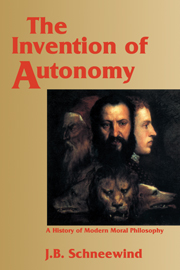Book contents
- Frontmatter
- Contents
- Preface
- Acknowledgments
- A note on references and abbreviations
- Introduction
- Part I The rise and fall of modern natural law
- Part II Perfectionism and rationality
- Part III Toward a world on its own
- Part IV Autonomy and divine order
- 20 Perfection and will: Wolff and Crusius
- 21 Religion, morality, and reform
- 22 The invention of autonomy
- 23 Kant in the history of moral philosophy
- Epilogue
- Bibliography
- Index of names
- Index of subjects
- Index of biblical citations
22 - The invention of autonomy
Published online by Cambridge University Press: 05 June 2012
- Frontmatter
- Contents
- Preface
- Acknowledgments
- A note on references and abbreviations
- Introduction
- Part I The rise and fall of modern natural law
- Part II Perfectionism and rationality
- Part III Toward a world on its own
- Part IV Autonomy and divine order
- 20 Perfection and will: Wolff and Crusius
- 21 Religion, morality, and reform
- 22 The invention of autonomy
- 23 Kant in the history of moral philosophy
- Epilogue
- Bibliography
- Index of names
- Index of subjects
- Index of biblical citations
Summary
At the core of the moral philosophy of Immanuel Kant (1724–1804) is the claim that morality centers on a law that human beings impose on themselves, necessarily providing themselves, in doing so, with a motive to obey. Kant speaks of agents who are morally self-governed in this way as autonomous. He took the term from the political thought of the seventeenth and eighteenth centuries, in which it was used in discussions of the idea of states as self-governing entities. I have indicated that the idea of moral self-governance goes back at least as far as St. Paul's assertion in Romans 2.14 that the gentiles are “a law unto themselves.” Kant understood the idea in a radically different way. His view of morality as autonomy is something new in the history of thought.
I do not propose to summarize Kant's mature moral philosophy or to engage in exegesis or assessment of it. Assuming the reader's familiarity with his view, I address two topics that have received much less attention in the literature than the structure and adequacy of the theory. In this chapter I offer an account of how Kant came to take the first major step toward his view of morality as autonomy. In the next chapter I discuss some of the ways in which Kant's mature moral philosophy is related to the views of his seventeenth- and eighteenth-century predecessors.
- Type
- Chapter
- Information
- The Invention of AutonomyA History of Modern Moral Philosophy, pp. 483 - 507Publisher: Cambridge University PressPrint publication year: 1997
- 1
- Cited by



